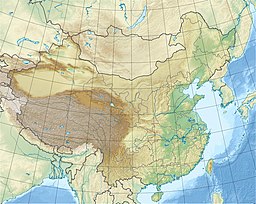
Back بحيره لوجو ARZ Llac Lugu Catalan Lugu Hu CEB Лугу CV Lugu-See German Lago Lugu Spanish Lugu lakua EU دریاچه لوگو FA Lugujärvi Finnish Lac Lugu French
| Lugu Lake | |
|---|---|
 Lugu Lake's Lige | |
| Location | |
| Coordinates | 27°42′N 100°48′E / 27.7°N 100.8°E |
| Primary inflows | Mosuo River |
| Primary outflows | Gaizu River (seasonal) joining Yalong River |
| Catchment area | 171.4 square kilometres (66.2 sq mi) |
| Basin countries | China |
| Max. length | 9.4 kilometres (5.8 mi) |
| Max. width | 5.2 kilometres (3.2 mi) (average) |
| Surface area | 48.5 square kilometres (18.7 sq mi) |
| Max. depth | 93.5 metres (307 ft) |
| Residence time | 18 years[1] |
| Surface elevation | 2,685 metres (8,809 ft) |
| Islands | Five |
Lugu Lake (simplified Chinese: 泸沽湖; traditional Chinese: 瀘沽湖; pinyin: Lúgū Hú) is located in the northwest of the Yunnan plateau, with the middle of the lake forming the border between the Ninglang County of Yunnan Province and the Yanyuan County of Sichuan Province. The formation of the lake is thought to have occurred in a geological fault belonging to the geological age of the Late Cenozoic. It is an alpine lake at an elevation of 2,685 metres (8,809 ft) and is the highest lake in the Yunnan Province. The lake is surrounded by mountains and has five islands, four peninsulas, fourteen bays and seventeen beaches.[2][3][4][5][6][7]
The lake's shores are inhabited by many minority ethnic groups, such as the Mosuo, Norzu, Yi, and Pumi. The most numerous of these are the Mosuo people (also spelt "Moso"), said to be a sub clan of the Naxi people (as per Chinese records of Minorities in China) with ancient family structure considered as "a live fossil for researching the marital development history of Human beings" and "the last quaint Realm of Matriarchy." It is considered as the home of the Moso Tribe[3][4][8][9] However, Mosuo have a separate identity from the Naxis, as it is said that the Chinese used the word Mosuo as a generic term for different ethnic groups, including the Naxi.[8]
Lugu Lake is called the "mother lake" by the Mosuo people.[10] The lake is also well known in Chinese travel pamphlets as the region of “Amazons,” “The Kingdom of Women” and “Home of the Matriarchal Tribe”, this last name highlighting the dominant role of the Mosuo women in their society.[4] The marriage rites of the Mosuo people are known as “azhu marriage” ceremony and this unique aspect of their social culture has given the title “exotic land of daughters” to the area.[5] It is also known as "A Quaint Realm of Matriarchy."[11][12][13] The matriarchal and matrilineal society of the Mosuos is also termed the “Women’s World.”[14]
- ^ "Lake Lugu | World Lake Database - ILEC". wldb.ilec.or.jp. Archived from the original on 8 January 2020. Retrieved 13 June 2018.
- ^ "Fish Fauna Status in the Lugu Lake with Preliminary Analysis on Cause and Effect of Human Impacts". Zoological Research, Kuming Institute of Zoology. Archived from the original on 2014-10-10. Retrieved 2010-08-20.
{{cite web}}: CS1 maint: bot: original URL status unknown (link) - ^ a b "Travel:Lugu Lake". CRIENGLISH.com. Archived from the original on June 30, 2012. Retrieved 2010-08-19.
- ^ a b c Mansfield, Stephen; Martin Walters (2007). China: Yunnan Province. Bradt Travel Guides. pp. 149–150. ISBN 978-1-84162-169-2.
{{cite book}}:|work=ignored (help) - ^ a b Guo, Huancheng; Guozhu Ren; Mingwei Lü (2007). Countryside of China. China Intercontinental Press. pp. 105–109. ISBN 978-7-5085-1096-5. Retrieved 2010-08-19.
{{cite book}}:|work=ignored (help) - ^ Dorje, Gyurme (1999). Tibet handbook: with Bhutan. Footprint Travel Guides. pp. 425–426. ISBN 1-900949-33-4. Retrieved 2010-08-19.
- ^ Legerton, Colin; Jacob Rawson (2009). Invisible China: A Journey Through Ethnic Borderlands. Chicago Review Press. pp. 129-. ISBN 978-1-55652-814-9. Retrieved 2010-08-20.
Lugu Lake.
{{cite book}}:|work=ignored (help) - ^ a b "Myths & Misperceptions". Mosuo Project Organization. Retrieved 2010-08-20.
- ^ "Lugo Lake Mosuo Cultural Development Association". Mosuo Project Organization. Retrieved 2007-08-06.
- ^ "Key Tourist Attraction In Sichuan". China Chamber of International Congress: Saichun Chamber of Commerce. Archived from the original on 2009-09-25. Retrieved 2010-08-20.
- ^ "Lugu Lake". Travel China Kunming. Archived from the original on 2010-06-02. Retrieved 2010-08-20.
- ^ "Lugu Lake". Travel China Guide. Retrieved 2010-08-20.
- ^ Cite error: The named reference
Hattawaywas invoked but never defined (see the help page). - ^ "Housing shortage" (PDF). The Musuo People. Key Kalahea Newspaper of the University of Hawaii, Fall 2004 Issue 2. 2004-09-15. p. 5. Archived from the original (PDF) on 2012-02-27. Retrieved 2010-08-20.


